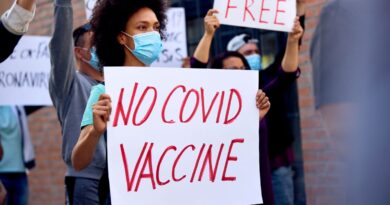Can We Rescue Anti-Vax Victims?
In the end, I think it was the news about people getting vaccinated in disguise that broke me. A doctor in Missouri, where anti-vax sentiment runs high, said people who wanted to get the COVID-19 vaccine were so afraid of how their friends and neighbors would react that they had begun showing up in disguise to get their shots.
As Missourians donned trench coats and fedoras, it struck me that there may be too wide a chasm between those of us who trust the scientific evidence and those who remain militantly opposed to vaccines in the face of overwhelming data. (But three cheers to the band The Mountain Goats, which responded to these stories by publicly offering to provide an alibi for anyone who got vaccinated over the objections of their community.)

As a journalist, I operate from a deeply held belief that education on any topic is possible so long as someone takes the time and effort to strip down the hype, wipe away the lies, and hold up the truth for all to see. Longtime Techonomy readers know that I have worked throughout the pandemic to report accurately on the science of the virus and public health. One of my recent articles aimed at debunking commonplace myths about the vaccines.
What if all of these efforts to educate — from countless journalists, public health officials, scientists, and others around the world — could never be enough?
What we really need is someone who has been on both sides of that chasm, and could offer a roadmap for how people who were fierce advocates on one side of the debate could become champions of the other side. While I don’t know who has made that transition in the vaccine debate, I did know someone who switched sides in another big battle: Mark Lynas, a British journalist. This former anti-GMO activist later dug into the science and publicly acknowledged that he had been wrong to oppose GMOs. He described his conversion in the book Seeds of Science: Why We Got It So Wrong on GMOs. Would he talk to me about the anti-vax movement, even though it was completely unrelated to the anti-GMO movement?
He would. And he pointed out that there is actually quite a bit of overlap between those in the anti-GMO and anti-vax movements, particularly when it comes to the individuals and organizations providing the funding. “You can sort of see a coherence of that worldview,” Lynas told me. “Everything natural must be good, everything human-made and artificial must be bad.”

“It goes along with a kind of conspiracist viewpoint and a suspicion of authority that links up with a bunch of anti-science beliefs,” he adds. Science itself smacks of authority to these people, he said, making it inherently untrustworthy.
Even in his anti-GMO days, though, Lynas says he was never anti-science. He struggles to understand the anti-vax movement, but has been concerned about it for years. “I always thought, ‘Well, maybe if there’s a pandemic … the anti-vaccination movement will die a very rapid death.’ How wrong I was,” Lynas says. “It seems as if the COVID-19 pandemic has given a new lease of life to a movement that is really very difficult to explain, let alone understand or justify.”
While we may not be able to explain it, there are some steps that can be taken to improve the situation by separating the small cadre of anti-vax leaders from the victims of their disinformation campaigns.
‘Deplatform the disinformers’
That the first step begins on Facebook should come as no surprise. In a recent study, academic scientists participating in the COVID States Project found that the social media platform was highly correlated with people’s reluctance to get vaccinated. “We find that those who are most reliant on Facebook for information have substantially lower vaccination rates than those who rely on other sources,” the scientists report. “In fact, Facebook news consumers are less likely to be vaccinated than people who get their COVID-19 information from the often vaccine-skeptical Fox News.”
Earlier this year, an analysis from the nonprofit Center for Countering Digital Hate identified 12 people who were responsible for 65% of the anti-vaccine content on Facebook and Twitter. Dubbed the “Disinformation Dozen,” these people had repeatedly violated the terms of service of these platforms — but most were still active there.
“You have to stop the exposure. You have to deplatform the disinformers,” Lynas says. “People can’t make informed, sensible decisions when they’re being faced with disinformation.”
The Disinformation Dozen aren’t simply expressing opinions. “They are responsible for thousands, tens of thousands of deaths, if not more, and they will be responsible for prolonging the pandemic with incalculable costs in terms of lost productivity, economics, and people’s livelihood. We can’t just sit back and say, ‘Well, let the debate happen,’” Lynas says. “They might as well be pulling the trigger at a mass shooting in terms of the impact they’re having, and we should hit them with the full force of the law and whatever can be managed in a civilized, open society.”
It’s also worth following the money: some members of the Disinformation Dozen profit handsomely from their anti-vaccine lies by selling dietary supplements of dubious value and other items to their victims.
Democrats need to pipe down
Ironically, a step that may help boost vaccination rates among the hesitant is for Democrats to stop encouraging the vaccines. A recently published paper from researchers at Stanford and other universities reports fascinating, if disheartening, results from a study of how nearly 1,500 self-identified Republicans respond to vaccine endorsements. (They focused on this group because vaccine hesitancy remains stubbornly high among Republicans even as it has decreased substantially among Democrats.)
In the project, they monitored participants’ willingness to get vaccinated both before and after watching a video endorsement for COVID-19 vaccines. Some participants watched a video from a high-ranking Democrat, such as Joe Biden; some watched a video from a Republican leader, such as Donald Trump; and others served as neutral controls by seeing no endorsements. While unvaccinated Republicans were 7% more likely to get the vaccine after watching the Republican endorsement, those who saw a Democrat pushing the vaccine became even less likely to get vaccinated.
Maybe it’s the Democrats who should be going in disguise.
One of the reasons I had wanted to speak with Lynas was a passage from Seeds of Science where he acknowledged that it wasn’t the overwhelming scientific data about the safety of GMO foods that finally got him to change his mind — it was that he had begun spending more time with scientists, and in doing so began valuing their perspective. “Deep down I probably cared less about actual truth than I did about my reputation for truth within my new scientific tribe,” he wrote. Extending that concept to the anti-vax movement, it seems clear that there is no perfect data point, no trend chart, no tipping point of information that will get anti-vax activists to switch sides. But perhaps efforts to recruit community leaders to the cause — church leaders, barbershop owners, and other trusted local sources of information — will give people the breathing room they need to consider a different view — hopefully a view that will save their lives.


